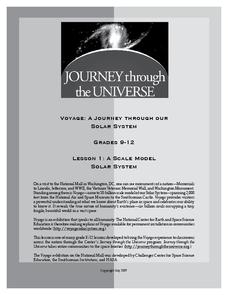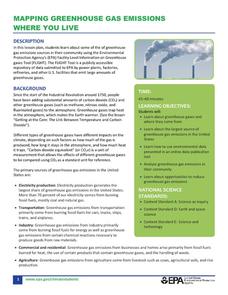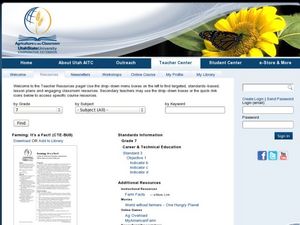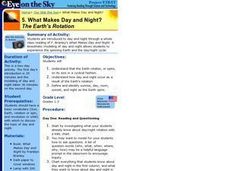Earth Day Network
The Neolithic Revolution
With the abundance of food products we can easily access in our society today, it is easy to forget the toll this can take on our global environment. Young learners will discover how the transition to agriculture and domesticated living...
Population Connection
The Peopling of Our Planet
How many people live on the planet, anyway? The first resource in a six-part series covers the topic of the world population. Scholars work in groups to conduct research and make population posters after learning about the global...
Curated OER
Imperialism in Africa
Learners study imperialism in Africa. In this Imperialism lesson plan, students consider how democratic revolutions around the world led to imperialism in Africa.
Curated OER
Modeling the Seasons
Junior geologists become the force that makes the world go around! With a lamp on the floor in the middle of the room to represent the sun, volunteers hold a globe, revolve, and rotate. Observers notice how the light hitting the globe...
Journey Through the Universe
A Scale Model Solar System
Between the time scientists discovered Pluto and reclassified it as a dwarf planet, it did not even make one full revolution around the sun. In two activities, scholars investigate scale models and their properties. Pupils find that it...
Curated OER
Seasons' Journey: As the World Turns
Fourth graders explore the earth's revolution around the sun and the changes in weather that follow this motion.
Curated OER
Environment -- Unit on Globalization and the Environment
Students examine the effect of human activities on the environment. They discover issues that are causing problems around the world. They participate in a debate using their own research.
Curated OER
Unit VIII Worksheet 5: Circular Motion
Seven problems send physics stars out of this world! Challenge learners to calculate centripetal force, time to complete revolutions, circular speed, and acceleration. They also are asked to explain scenarios and draw a force diagram for...
US Environmental Protection Agency
Mapping Greenhouse Gas Emissions Where You Live
After investigating the US Environmental Protection Agency's climate change website, your environmental studies learners discuss greenhouse gas emissions. They use an online interactive tool to look at data from power production...
Curated OER
What Causes Day and Night?
Why do we have four seasons? A series of questions about the Earth's orbit and its impact on seasons challenge Earth science students.The second page of the resource has nine multiple choice questions, such as "One year on Earth is one...
National Wildlife Federation
Quantifying Land Changes Over Time in Areas of Deforestation and Urbanization
Is qualitative or quantitative research more convincing when it comes to climate change? In the eighth lesson during this 21-part series, scholars begin by performing a quantitative analysis of deforestation and urbanization. Then, they...
Curated OER
Shadow Trackers: From Photography to Writing
Students explore the rotation of the earth. In this science instructional activity, students view photos of various places around the world. Students conduct an experiment in which they can see how the earth's rotation creates shadows on...
Curated OER
Sundials and Shadows - What Can They Teach Us About Seasons?
Students collect and analyze data relating to seasonal changes. They view a video, research web sites and build a sundial to collect their data.
Curated OER
Farming: It's a Fact!
Students use worksheets, food items, and computer programs to learn about the path of food from the farm to their meals. In this agriculture lesson, students use a provided worksheet to learn facts about farming. They use a bag of...
Cornell University
Fibers, Dyes, and the Environment
Nanofibers can be made through electrospinning or force spinning in order to reduce the negative impact on the environment. Pupils study the role of fibers and dye on the environment through a series of five hands-on activities. Then,...
Curated OER
The Solstices
Compare surface temperatures when the solstice occurs in the different hemispheres. Young scientists draw conclusions from their investigation of data collected using spreadsheets and a globe.
Curated OER
Tides - The Ins and Outs of Tides
Get your junior oceanographers to generate tidal prediction graphs on an interactive website. They will feel like experts in the field, or shall we say, experts in the ocean! This is a brief, but worthwhile activity that could be used to...
Curated OER
Space Age Technology Comes to Earth
Students explore jobs related to agriculture. In this technology/agriculture lesson plan, students recognize the importance of natural resources and agriculture on the use of Range Rambler software. Students complete an experiment...
Curated OER
Starring...Bears!
Students illustrate a First Nations' legend. In this legend of bears lesson, students read several legends which involve bears and groups of stars or constellations. After reading, students illustrate portions of the stories....
Curated OER
Understanding Human Population Growth
You can help students learn about the causes and consequences of our rapidly growing global population
Curated OER
Electrical Conduction in Semiconductors
In this electronics worksheet, students explore the properties of semiconductors to complete 17 short answer and problem solving questions.
Curated OER
Leap Year
In this Leap Year reading comprehension worksheet, can learn about the various types of calendars (lunar, solar, etc.) and answer 7 multiple choice questions. Also included is a word search of key terms.
Curated OER
Ptolemy vs. Copernicus
Students list differences in the diagrams of a geocentric universe and a heliocentric universe. They students describe the religious impact of this change on man's conception of the universe and man's place within it. Students describe...
Curated OER
What Makes Day and Night? The Earth's Rotation
Students discover that the Earth rotates on its axis in a cyclical fashion. They examine how this rotation results in day and night.























